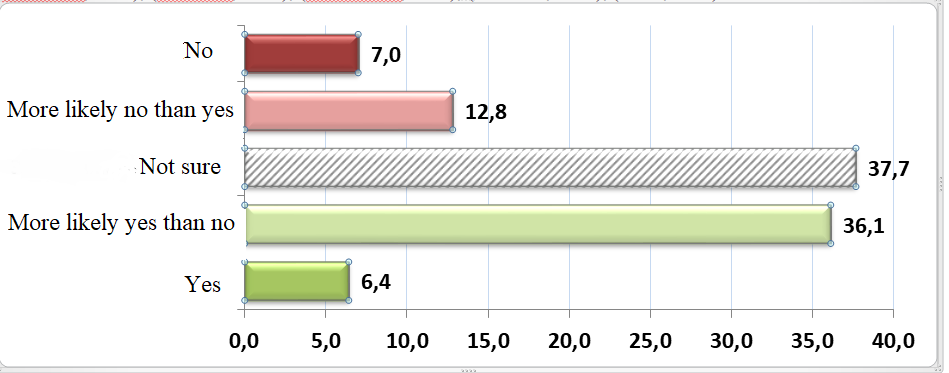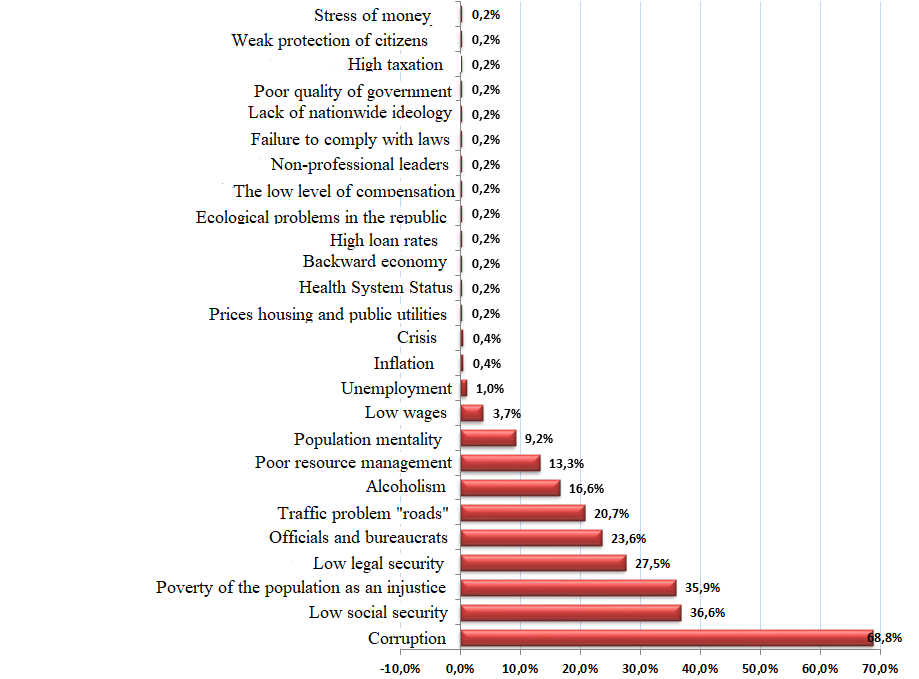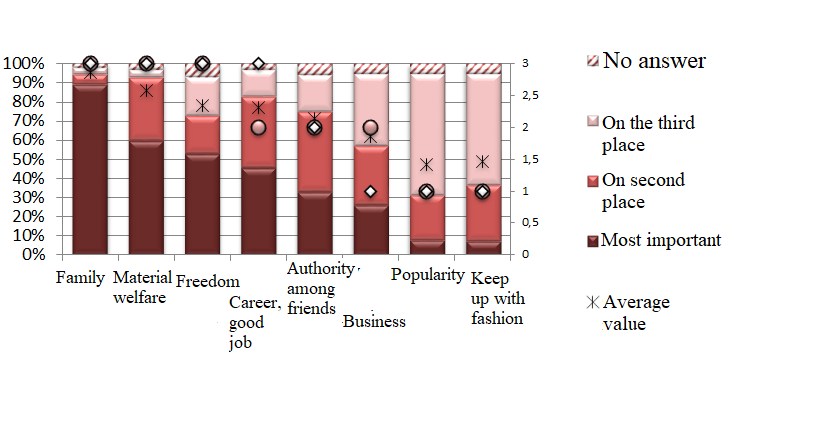Abstract
The article substantiates the relevance of ethno-sociological and socio-psychological research of worldview, issues of self-identification, as well as the needs and expectations of modern youth. The aim of the research was to study the value systems, the most important stereotypes and mythologies prevalent among young people. At the same time, civil initiatives of the youth of the North Caucasus are analyzed in the deveplopment of the socio-political and cultural spheres. On the example of the activity of youth parliamentarism, aspects of the implementation of regional youth policy are considered. The novelty of socio-psychological research is that in modern society the process of socialization of young people is complicated by the factors that arise as a result of the reassessment of traditional attitudes and norms. At the same time, the family remains an extrinsic value for the younger generation, and in their future life they strive to create their own happy family. In the course of the study, 506 respondents from the cities of Stavropol and Vladikavkaz, aged 16-30, were interview. It was revealed that with ideological identification, young people in the region have little interest in politics - a third of the respondents are categorical in their denial of interest in politics, more than a quarter show little interest. The results of the study are considered in the context of significant indicators for the modern youth of the North Caucasus: family, authority, career, good work and business. The last thing – the popularity and compliance with fashion trends.
Keywords: North Caucasusyouth policyvalue systemsocial and political developmentsocio-psychological analysisyouth parliamentarism
Introduction
Young people are the most active category of the population, possessing enormous potential, and at the same time requiring support and support in various fields of activity. It is worth noting that the stage of personal formation of modern youth began in the period of transformation processes that have changed a lot in the life of Russian society. The younger generation was the most vulnerable and susceptible to negative moral transit. Changes affected mental and behavioral norms, there was a change of life priorities and reassessment of values. In this regard, the problem of society's perception of the new social reality remains relevant, and the study of changes in the consciousness of modern youth acquires value.
Indicators of the socio-cultural well-being of young people can be creative and social activity, civic initiatives and practices in various fields. (American Sociological Association, 2015). So, one of the manifestations of a civic active position is participation in youth socio-political and national cultural societies, associations and structures. Since the end of the last century, the youth parliamentary movement, which largely determined the policy of the state and society in the youth sphere, was actively developed and quickly became the real driving force. In many regions, it was youth organizations that influenced the development and adoption of laws on youth and youth policy.
The normative legal acts regulating the activity and mechanism of formation of youth parliaments are the Resolutions of regional authorities on the establishment of youth parliaments, the Regulations of work. The main functions of the youth parliament include participation in the formation and implementation of the state youth policy in a particular region; participation in the development of regional regulations, including on issues affecting the rights and legitimate interests of young people; involvement of young citizens in parliamentary and other social activities; formation of legal and political culture of the young generation, support for creative and civic activity of young people; ensuring the interaction of young people, youth public associations with the state authorities of the region and local authorities (Information of the Youth Parliament, 2017).
Today, a significant number of youth parliaments at the federal, regional and municipal levels have been formed and are operating in the Russian Federation. The youth parliament of the Republic of North Ossetia-Alania, as a subordinate organization of the legislative authority, pays great attention to legislative initiatives. Having actively involved in the work, the youth parliament initiated a number of actions and projects that received a wide public response. Stormy discussion in social networks caused an initiative to limit smoking of a hookah in public places, as propaganda of cultural activities and support of a healthy lifestyle (Information of the Youth Parliament, 2017). The youth parliament acted as a mediator in the dialogue of the initiative group of the creative laboratory "Portal" and the administration of Vladikavkaz on the allocation of a new site. Another activity was organized with the direct participation of activists of the youth parliament were the Days for the scientific film at the all-Russian Festival of contemporary scientific cinema of the new format.
The festival featured the most interesting full-length documentary films about science, created over the past five years. Acquaintance with actual scientific problems was held in the format of film with an assistant professor, so after viewing, discussions were organized with the participation of specialists in these fields of science. An important scientific event was the opening of the first Center for Youth Innovative Creativity in Ossetia. As part of this event, the youth parliament presented a multi-stage program Support and Development of Talented Youth of North Ossetia, prepared jointly with the republican representative office of the Innovation Promotion Foundation, FabLaba, and the Association of Young Scientists of the Republic. Today, a technological initiative is being actively implemented in the country, which rises several questions to society, the most pressing of which are: How to identify talents? , How to develop them?, How to keep in Russia? (Cited by: Information of the Youth Parliament of the Republic North Ossetia – Alania II convocation on the results of activities for 2016-2017) (Information of the Youth Parliament, 2017).
The theoretical justification. Great importance to the study of the socio-psychological, socio-political and cultural life of the population in various regions, including youth, is given by domestic and foreign scientists (Adamyants, 2014; Dondurej, 2010; Karpova, 2011; Radchenko, 2017; Tuaeva & Usova, 2009; Ikonnikova, 1974; Komarov, 1986; Blazhanova, 1997; Hoffman, 1986; Sears, 1987) and others.
Problem Statement
The problem of research is the need to study the value orientations of modern youth. The problems of the most important stereotypes and myths that are common among young people are currently relevant both in practical and theoretical terms. The study of the socio-psychological well-being and the process of the formation of the ideological orientations of young people are an essential element of the value relations of modern society, being the guarantor of its progressive development and stability, due to the influence of socio-economic, political, cultural factors.
Research Questions
The subject of the research is the peculiarities of the formation of value orientations and the socio-psychological attitudes of modern youth in the context of regional socio-political and cultural life.
Purpose of the Study
The purpose of the study is to determine the value orientations, the most important stereotypes and myths prevalent in the youth environment. The object of the study was residents of the North Caucasus aged 16 to 30 years.
Research Methods
In the article the research methods of the sociological and psychological survey in the form of a formalized interview with open questions are used, as well as using the method of Value Orientations by M. Rokich. The pilot study involved 506 respondents. The results were subjected to statistical analysis.
Findings
The study proves that the youth and its value orientations are a big, complex and urgent problem. In modern society, the process of youth socialization is complicated by problems that may arise as a result of a reassessment of traditions and norms. Numerous studies and monitoring denote sensitive issue, anxieties and hopes of modern youth. This section includes the results of ethnosociological and socio-psychological research, which should be taken into account when developing various strategies and programs, including youth policy.
In 2017, on the basis of the Research Institute of Strategic Studies of Pyatigorsk State University, a socio-psychological analysis was conducted on the issue Value system of Modern Youth (Research Institute for Strategic, 2018). Analysis and evaluation of the results of the study showed that in terms of ideological identification, young people in the region have little interest in politics – a third of the respondents are categorical in their denial of interest in politics, more than a quarter show little interest.
Only one in ten respondents admitted that the policy definitely interests him, and 19% of respondents with some degree of doubt tend to talk about political processes. At the same time, the higher the level of education, the greater the interest in politics. More than 20 % of respondents could not name a party that would express their interests. The vast majority believe that political parties do not clearly express the interests of young people, while the most skeptical attitude is observed among representatives of the 1 age group (16-19 years). The absence of political parties expressing the interests of respondents is a nationwide trend in society, in general, and the youth segment in particular. At the same time, the implicitness and uncertainty of political identification correlates with the uncertainty of social identification. Political nihilism is the result of frequent divergences between the stated objectives of the parties and the actual results of their activities.
More than 40% of respondents like life in modern Russia in a varying degree. This is 2 times more than the proportion of those who keep to the opposite position. Another 37% of respondents found it difficult to state their position on this issue. Attitudes toward a country consist of a mass of factors, among which such indicators as attitudes toward the authorities and the results of its activities, especially in crisis situations, play an important role (Figure

More than 34% of respondents believe that reforms in the Russian Federation are carried out in the interests of the youth and the future of the country. 32% of respondents do not agree with this opinion. In this case, the older a young man, the greater the likelihood of his belonging to a group of dissenters. Almost half of the respondents identify themselves as citizens of Russia, more than a third of the respondents single out, above all, the status of nationality. Most young people (70.0%) are confident in the decent future of Russia as a great power with a strong economy, with developed democratic institutions. But, despite the conviction in the inspired pride of the past and the great future of Russia, its present is rather assessed as a crisis, characterized by poor living conditions of the population. The rating of Russian problems, according to the respondents, is headed by corruption (68.8%), followed by low social and legal security, poverty of the population, domination of bureaucracy, poor quality of roads and alcoholism (Figure
Unfortunately, young people do not see potential in the institutions of civil society. About 40% of respondents position themselves as active and ambitious patriots who should solve the problems of the country. Criticism of power structures, most likely, is not unfounded. However, criticizing the institutions of power, young people show flagrant ignorance in elementary issues of government. State youth policy is assessed as effective by 20% of respondents. The rest consider it ineffective in varying degrees.
The ranking of the life priorities of young people made it possible to determine that the respondents consider the traditional family, material well-being and democratic freedoms to be the most important for them. (Tuaeva & Usova, 2016). To compare the average life priorities of young people in the North Caucasus, we used the Student's t-test (using the SPSS computer program). Statistically significant differences (at the level of p≤0.001) were found in the modern youth environment in such values as happy family life.

No statistically significant difference in the value of material well-being was found. Further, the youth environment is characterized by a more pronounced significance of the value of a happy family life. There was also a comparison of the average indicators among young people in the selection of such motives as material well-being and democratic freedoms. Small differences were revealed. Based on the attained results, we can conclude that for the youth environment such values as happy family life and material well-being occupy leading positions. After analyzing the research data, it can be noted that authority, career, good work and business are less significant. In the last place is popularity and fashion conformity (Figure

Young people express concern that they do not have the opportunity to receive a decent wage, they do not see ample opportunities for self-realization. A significant problem is the lack of own housing and the impossibility of its acquisition. It is important that every fourth young man raises the problem of the spread of alcoholism and drug addiction. The layering of problems (primarily of an economic nature) and the limited ability to solve them can create prerequisites and a social background for the formation of protest moods, especially among young people. However, today, the probability of revolutionary upheavals in Russia is indicated by a not so large number of respondents. For 70% of respondents, there are no protest movements close in spirit and interests (Research Institute for Strategic, 2018).
Despite the relatively high rate of happiness among young people, 32% of respondents expressed an intention not to leave the region. Many would like to get a good education or gain work experience, and then go back. This seems to be a well thought out scheme. But the problem is that the most successful young people outside the region are in no hurry to return. Migration attitudes of youth, in principle, could be considered as a positive phenomenon of social mobility. However, it is necessary to take into account the situation. First, social mobility is only useful to society when it is carried out in the same direction, and the outflow of young people is compensated by inflow from other regions. This form of mobility has not yet become widespread, as economic problems do not allow for a full-fledged influx of young specialists to the region. Secondly, the most competitive young people on the labor market are leaving the region, thereby filling other, mainly metropolitan, regions with labor and intellectual potential.
Conclusion
Therefore, in conclusion of this study, it is confirmed that the youth and its value orientations are a big, complex and urgent problem. In modern society, the process of youth socialization is complicated by problems that arise as a result of the reassessment of traditions and norms. The family remains a extrinsic value for members of the younger generation and in their future life they strive to create their own happy family. No less significant, formed in the process of secondary socialization, is the value of material well-being. Most respondents look to the future with hope and optimism.
References
- Adamyants, T. Z. (2014). Human, 3, 34–41.
- American Sociological Association: asanet.org. (2015). Retrieved 4 April.
- Blazhanova, E. A. (1997). Maturity of consciousness: On the formation of the political culture of youth. Moscow: Moscow worker.
- Burmistrova, Ju. Ju. (2012). Social and legal aspects of the cultural policy of Russia in the field of the protection of cultural values. Tambov: Gramota, vol. 1, No 11, 56-59.
- Dondurej, D. B., Serebrennikov, K. S. (2010). Culture should work for development. Social Sciences and Modernity, 2, 86-93.
- Hoffman, S. (1986). On the Political Psychology of Peace and War: a Critique and an Agenda. Political Psychology, 7(1).
- Karpova, G. G. (2011). Social dynamics of cultural policy in contemporary Russia (Master’s thesis).
- Ikonnikova, S. N. (1974). Youth. Sociological and Social-Psychological Analysis. Leningrad: Leningrad State University.
- Information of the Youth Parliament of the Republic of North Ossetia - Alania II convocation on the results of activities for 2016-2017. (2017). Parliament of the Republic of North Ossetia-Alania. Official website. Retrieved from: http://parliamentosetia.ru/index.php/main/youth/actyouth/art/6993
- Komarov, E. G. (1986). Political Culture and Youth: Problems of Formation and Development. Moscow: Think.
- Research Institute for Strategic Studies, the Institute of International Relations, Pyatigorsk State University. (2018). Value system of Modern Youth Retrieved from: http://pglu.ru/information/structure/deps/detail.php?ELEMENT_ID=13741
- Radchenko, A. F. (2017). Youth policy and civil society. Geopolitics and patriotic education, 26, 17-27.
- Tuaeva, B. V., Usova, Ju. V. (2009). Crisis and inversions of polyethnic urban society. Problems of universal history and political science. Collection of scientific papers, B. G. Koibaeva (Ed.). Vladikavkaz: NOSU.
- Tuaeva, B. V., Usova, Ju. V. (2016). On the issue of Russia's integration into the European cultural and educational system. Successes of modern science, 9, 123-124.
- Sears, D. O. (1987). Political Psychology. Annual Review of Psychology. Palo Alto
Copyright information

This work is licensed under a Creative Commons Attribution-NonCommercial-NoDerivatives 4.0 International License.
About this article
Publication Date
29 March 2019
Article Doi
eBook ISBN
978-1-80296-057-0
Publisher
Future Academy
Volume
58
Print ISBN (optional)
-
Edition Number
1st Edition
Pages
1-2787
Subjects
Sociolinguistics, linguistics, semantics, discourse analysis, science, technology, society
Cite this article as:
Tuaeva, B. V., Usova, J. V., Gusova, A. D., & Plieva, Z. T. (2019). Civil Initiatives Of Youth Of North Caucasus In Development Of The Region. In D. K. Bataev (Ed.), Social and Cultural Transformations in the Context of Modern Globalism, vol 58. European Proceedings of Social and Behavioural Sciences (pp. 2631-2637). Future Academy. https://doi.org/10.15405/epsbs.2019.03.02.305
